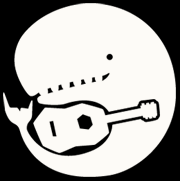Brak Records Interview
Brak Records is a small, Icelandic lo-fi label that operated out of the Havari store in downtown Reykjavik and online. We sat down to a short chat with main man Petur in the sun at the backside of Havari to talk about how indie labels in Iceland operate.
Petur: Sure. Actually, I’m going to get the catalogue (laughs). This here is the stuff we released in the past. We started in January last year, and since then we have been able to release one album each month. Sometimes two. The basic concept is that we find an artist that we like, and we offer a release – most of the things are already home-recorded, so we’re not doing anything extravagant – to put their stuff out. And they have complete artistic control.
Marcel: And when it’s on your label, it’s listed and they can sell it through the shops and getting a press release?
Petur: Exactly.
Marcel: And how does it work? Is it that because everyone knows everyone in Reykjavik people would come to you and ask if they can release something, or would you actively look for new artists?
Petur: A bit of both, really. The other day I put a request for demos up on the website and got a ton of responses, lots of stuff to listen to. And I really found stuff that I want to release. And there are also lots of people from Iceland who are not performing and only have a MySpace-page, for example, but they do great stuff. So we still manage to discover new things. It actually began with this CD, by a young guy who is also in a band called Me, The Slumbering Napoleon. And he gave this to me and Baldwin, who is running Kimi Records, I used to work there myself, and we thought it to be a really good album but we weren’t shure if it would be a commercial success. So we decided to start a lo-fi type of label to release this type of stuff and get the bands the attention they deserve.
After talking to Olafur Arnalds about record sales and finding out that 20 sold CD’s per week will put you in the top ten, we wonder what this means for labels, and what the outlook for the future is.
Marcel: And Icelanders still do buy CD’s? So it’s important to have your “product”, your CD to sell to people?
Petur: Yes, we are pretty old-fashioned (laughs). There are only two or three Icelandic platforms that offer digital sales. And there is no ITunes in Iceland, we don’t have access whatsoever.
Kai: Maybe that’s a good thing, for the local scene.
Petur: Yes, and the local scene has a very strong CD-release mentality.
Marcel: Is there any competition between labels? You said you worked for Kimi, and obviously everyone has to make a living somehow…
Petur: In this, the only competition is the people hand-making their CD’s. I wouldn’t say there’s any competition for this label based on the artists we represent. We are pretty capitalistic, haha. Of course there’s competition, but on the other hand I’d love to see some of our artists go on to bigger labels like Kimi or Bad Taste. We are pretty closely connected to Kimi, for example we have side-projects from some of their artists. And lot of these bands play on Kimi-showcases and so forth.
Marcel: But it’s good that you offer them a platform to start from.
Petur: Exactly – as soon as they have the finished CD they can start putting on more shows, just because people recognise the CD. Qadruplos for example are playing five or six times next week. And the same with Nolo, they’re all over the place since the release of the record. And they all are getting record reviews in the major newspapers, which is then a push for them to make more music. And that’s the great thing about it: it all boils down to more music in the end.
Marcel: Looking at all your releases and thinking that you’ve started in 2009, that’s very impressive.
Petur: Yes, we’re pretty pleased with it. Next month we are bringing out our first hip hop album, and an album by the Fistfokkers, short, hard punk songs. And in October we are putting out an EP with Ben Frost and Sudden Weather Change, which is very interesting, because it also means that we are starting to do the opposite, take bigger artists and make small releases with them, a sort of noise-culture thing.
This interview belongs to Chapter 8 – It was a good day.



